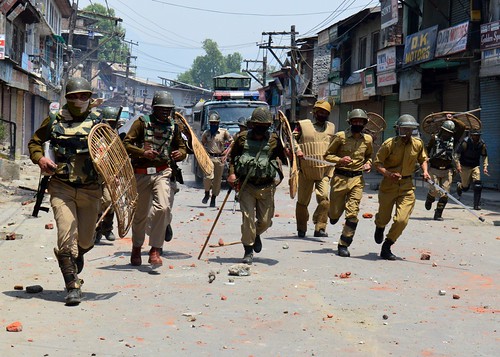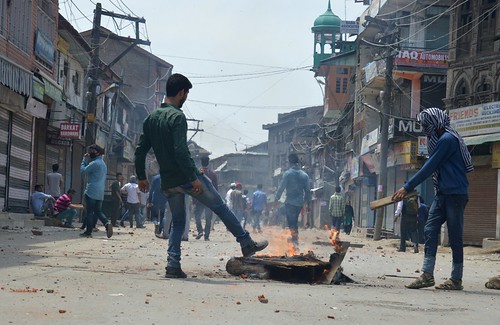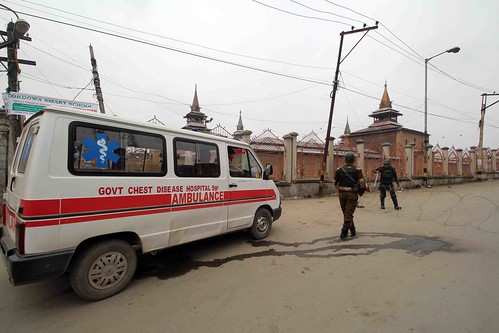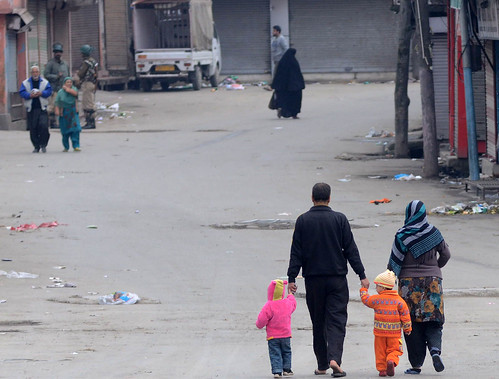By Raqib Hameed Naik, TwoCircles.net,
Srinagar: For the last one week, Sajid Khurshid Khan from Boniyar, Baramullah has barely slept. Khan, who is doing coaching for civil services in Delhi, is having nightmares regarding the safety of his family back in Kashmir and understandably so: he has not been able to speak with his family for the past one week after the government snapped all communication lines.
“I spoke to them last on July 13. Since then, all mobile phone connections in my family-Airtel, Aircel and Vodafone-have stopped working. Everyday, I wait for their call but my day ends up with receiving none,” Khan told TwoCircles.net over phone from Delhi.

Amir Bhat, 21 from Langate Handwara is another civil servant aspirant receiving coaching is Delhi and has a similar story to tell. “Only BSNL postpaid are working in Kashmir and no one in my family has that connection,” Bhat said.
As the vicious cycle of death completes two weeks in Kashmir with confirmed 50 deaths in 16 days, there seems to be no improvement in the prevailing situation. Hospitals remain packed with the injured, even as the ones already injured battle for their lives.
After the death of Hizbul commander Burhan Wani on July 8, the government responded by banning Internet in the whole state and initially suspending cellular services in South Kashmir and then extending it to whole Kashmir on July 15th.
Only postpaid services provided by BSNL, the government-run telecommunications company, are accessible in some parts of Kashmir as of now.

The suspension of cellular services has had a damning affect on the whole population of Kashmir division along with leaving their well wishers living in the rest of the country and the world with no information.
Thousands of Kashmiri students studying outside Kashmir have not heard anything from their loved ones since last one week and have been left chasing shadows, as they are unaware about when the government will lift the ban and restore services.
“Families and students outside Kashmir are worried about the welfare of their members because of no communications and no medium through which they can get information about the situation in their respective areas of Valley. The mainstream Indian media has put the renewed unrest in Kashmir under the carpet, thus depriving Kashmiri people outside the state of any updates about the prevailing situation in Kashmir,” Kashmir based activist Ezabir Ali told TwoCircles.net over her BSNL postpaid connection from Srinagar.
The suspension of cellular services has also created a room for rumours and speculation as people in Valley are left with no medium to know the events. With local cable network also banned, cross checking news and information remains a bigger challenge in this backdrop.

“There was water and electricity cut last week after cellular services were suspended in Srinagar. But rumors were spread in localities that after banning Internet and cellular services, the government was going to cut water supply and electricity so as to implement a Palestine-type genocide in Kashmir. I was so depressed and scared that I started storing water because there was no source through which I could have cross checked the info,” explained Ali.
The suspension of cellular services is also taking negative effect on psychiatric health of people in Kashmir as by this way they are exposed more to psychiatric ailments like anxiety and tension.
“When a communication ban is imposed on you and you are unable to get in touch with your loved ones, then it does end up in causing depression and various psychiatric ailments like anxiety, tension,” said Valley-based Dr Nissar Ul Hassan.
While briefing TwoCircles.net about the negative impact of the ban on patient care, he said, “It takes a serious and heavy toll on patient care. The patients across the Valley are tremendously suffering in the backdrop of snapping the phone lines. Most of the patients who can’t travel from various parts of Valley used to get treatment for their complications and follow-ups from doctors on cell phones only.”
Various international and human rights organisations, notably Amnesty International, have reprimanded the statement for blanket and indefinite suspensions of telecommunications services and have said that it does not comply with international human rights standards.

“These shutdowns affect the ability of phone and Internet users in Kashmir to seek, receive, and impart information, which is an integral part of the right to freedom of expression. The restrictions on access to telephones, in particular, jeopardize a range of other human rights as well, including the right to life,” said AI in a statement.
Amnesty International India have also revealed a letter from two telecom industry bodies to the Union Ministry of Communications asking for restrictions on voice services to be lifted.
“The letter, written by the Cellular Operators Association of India and the Association of Unified Telecom Service Providers on 15 July, states, We submit that complete shutdown of telecom network would lead to further anxiety in general public people and therefore voice services should not have been barred.”
The UN Special Rapporteur on freedom of expression and other global human rights experts have stated that shutting down entire parts of communications systems can never be justified under international human rights law.
As per the present trends of unrest in Kashmir, the Internet ban and suspension of cellular services seems likely to remain for an indefinite period. However, the bigger question of curtailment of people rights by PDP-BJP coalition will haunt them next time they go to ask for votes from the very same population.
